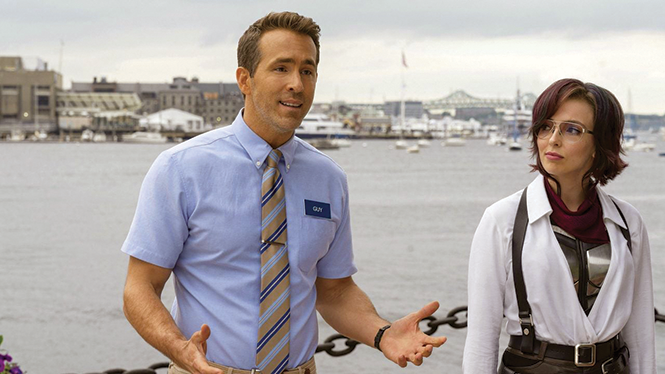
- 20th Century Studio
If you're already interested in seeing Free Guy, it's likely because you have a general sense of the premise: a non-player character named Guy (Ryan Reynolds) inside an open-world online video game called Free City who achieves self-awareness, and a desire for a life beyond his routine programming. But nested within that high concept is another narrative, about a programmer named Millie (Jodie Comer) in the real world trying to find proof that the wildly-popular Free City was based on her underlying concepts. It's a story, at least in part, about the importance of acknowledging when a creative work is dependent on someone else's previous creative work. And it's here where Free Guy becomes one of the most weirdly ironic movies of recent years.
Because let's be blunt: The basic architecture of Free Guy makes it The Matrix refashioned as a comedy. It never really hides the nature of Guy's world from the audience, and initially gets a lot of mileage out of the digital characters matter-of-factly accepting that explosions, car chases and other forms of violence are endemic to that world. Bank teller Guy and his best friend/co-worker, security guard Buddy (Lil Rel Howrey), are so accustomed to the daily parade of bank robberies that are part of game-play, that they drop to the ground and engage in idle banter while the crime is in progress. In much the same way that The Matrix spun philosophy around the notion that you rarely question whether the reality you're in could be different, Free Guy plays around with how that idea can lead people to feel that they don't have the power to change anything.
But it's not just The Matrix to which the screenplay—by Matt Lieberman and comic-book-movie veteran Zak Penn—is indebted. As Guy becomes famous throughout the Free City universe as the mysterious "Blue Shirt Guy" who keeps gaining experience points through acts of decency rather than the game's typical sociopathic violence, there's a heavy dose of The Truman Show, with real-world spectators getting caught up in the notion of someone challenging the status quo. There's even a heaping serving of Elf in Guy's perpetually sunny disposition and smiling fascination with every new experience.
The latter makes for different kind of Ryan Reynolds protagonist than we're used to seeing in stuff like Deadpool and The Hitman's Bodyguard, where his tart dialogue serves a fundamental cynicism. Here he provides entertainment with innocence, extracting maximum laughs out of an observation that the taste of his favorite ice cream is "like my tongue had a baby with a sunrise." As long as Guy is the center of attention—or Reynolds in general, taking into account other ways that his presence plays a role in the story—there's a bouncy sense of fun to the proceedings.
There is, however, the matter of that other plot-thread, involving Millie's pursuit of proof that her code was hijacked. That quest becomes part of a real-world tension between Millie and her former business partner, Keys (Joe Keery), who now works for Free City's cutthroat creator, Antwan (Taika Waititi, finding the sweet spot between entrepreneurial arrogance and buffoonery). Free Guy ends up spending a surprising amount of time focusing on their possible romance, as well as on Antwan's efforts to thwart Millie. And not surprising for a fantastical concept like this, it's not nearly as interesting when it's hanging out in the real world as it is within the game.
The problem is that, in the same way that Free Guy samples from too many influences to build its universe, it samples from too many thematic ideas in a premise that would be best served by simplicity in goofing on video-game logic and "gamer in his mom's basement" tropes. Is it a treatise on breaking free from a sense of powerlessness to make any world better? Is it about the curious power of unexpected decency to inspire people, even if they assume that everything is set up to crush that decency? And is it even aware of how odd it is to preach about the amazing things that can be born of original ideas, when the light-hearted silliness and cartoonish action keeps colliding with reminders that we've been here before?